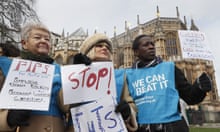The UK government is in a state of denial about the impact of austerity policies on the poor, UN rapporteur Philip Alston’s hard-hitting report on poverty, concluded. Here are some of the main points.
Austerity
Alston was critical of the “mentality” behind cuts and reforms introduced in the past few years that have brought misery and torn at the social fabric. “British compassion for those who are suffering has been replaced by a punitive, mean-spirited and callous approach …”
Universal credit
The government’s ambitious programme to simplify the benefits system was a good idea in principle but was “fast falling into universal discredit” and should be overhauled. It was gratuitously punitive in its effects. Draconian sanctions and long payment delays drove claimants into hardship, depression and despair.
Brexit
The most vulnerable and disadvantaged members of society will take the biggest hit from Brexit, Alston said. People felt their homes, jobs and communities were at risk. “Ironically it was these very fears and insecurity that contributed significantly to the Brexit vote.”
Who suffers?
“Changes to taxes and benefits have taken the highest toll on those least able to bear it,” said Alston, with the costs of austerity falling disproportionately on the poor, women, ethnic minorities, children, single parents, asylum seekers and people with disabilities.
Holes in the social safety net
Massive cuts to council funding, alongside big rises in demand for social care, had reduced many local authorities to providing basic services only, and had heralded the closure of libraries, parks and youth clubs. This was “damaging the fabric” of British society and eroding its sense of community.
Poverty
Alston said the UK government had told him the social support system was working and there was no extreme poverty in the UK. But the individual testimonies he received during his visit told a different story. “There is a striking and almost complete disconnect between what I heard from the government and what I consistently heard from many people directly, across the country.”
A digital welfare state
The government’s embrace of digital technology and automation was especially visible in universal credit, where the digital-by-default approach excluded people with no internet access or skills. “We are witnessing the gradual disappearance of the postwar British welfare state behind a webpage and an algorithm,” Alston said.










